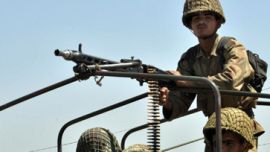
Battling religious extremism
Is Pakistan becoming the new global epicentre in the fight against religious extremism?
Many in the US now say the landscape of religious extremism has shifted from Afghanistan to Pakistan.
The Pakistani Taliban claimed responsibility for the failed Times Square bombing on May 1.
US authorities arrested 30-year-old Faisal Shahzad, a Pakistani American, who allegedly confessed that he learned to make bombs in North Waziristan.
Relations between Washington and Islamabad soured after Hillary Clinton, the US secretary of state, warned of “very severe consequences” for Pakistan if an attack similar to the one attempted in Times Square were to prove successful.
Observers are also indicating connections to Pakistan from other recent attacks and plots around the world.
In March, five men from northern Virginia were arrested in Pakistan after they allegedly tried to join al-Qaeda there.
Recently, Pakistani-American David Headley pleaded guilty to US federal charges about his involvement in the Mumbai attacks of 2008. He acknowledged receiving training in Pakistani camps.
| JOIN THE DEBATE |
The deadly London bombings in 2005 were carried out by four men – three of Pakistani descent.
On Wednesday’s Riz Khan we ask: To what extent is Pakistan becoming the new epicentre of religious extremism and what can be done to reverse that trend?
Joining the conversation will be Ikram Sehgal, a columnist and retired Pakistani army officer, Ayesha Jalal, a Pakistani-American sociologist and author who is a professor of history at Tufts University in the US, and Christine Fair, an assistant professor at the peace and security studies programme at Georgetown University.
This episode of the Riz Khan show aired from Wednesday, May 12, 2010.
